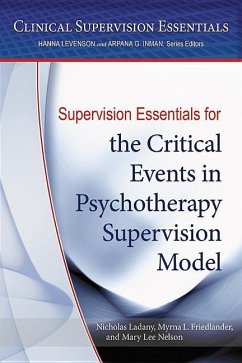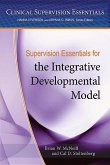Nicholas Ladany, Myrna L. Friedlander, Mary Lee Nelson
Supervision Essentials for the Critical Events in Psychotherapy Supervision Model
Nicholas Ladany, Myrna L. Friedlander, Mary Lee Nelson
Supervision Essentials for the Critical Events in Psychotherapy Supervision Model
- Broschiertes Buch
- Merkliste
- Auf die Merkliste
- Bewerten Bewerten
- Teilen
- Produkt teilen
- Produkterinnerung
- Produkterinnerung
Provides a blueprint to help supervisors navigate the most challenging dilemmas and conflicts that arise in the supervisory process. These include addressing skill deficits and competency concerns, working through role conflicts, and ethnicity and gender-related misunderstandings. This theoretically-grounded text is appropriate for supervisors and trainees of all theoretical orientations.
Andere Kunden interessierten sich auch für
![Supervision Essentials for the Integrative Developmental Model Supervision Essentials for the Integrative Developmental Model]() Brian W. McNeillSupervision Essentials for the Integrative Developmental Model47,99 €
Brian W. McNeillSupervision Essentials for the Integrative Developmental Model47,99 €![Supervision Essentials for the Feminist Psychotherapy Model of Supervision Supervision Essentials for the Feminist Psychotherapy Model of Supervision]() Laura S. BrownSupervision Essentials for the Feminist Psychotherapy Model of Supervision47,99 €
Laura S. BrownSupervision Essentials for the Feminist Psychotherapy Model of Supervision47,99 €![Supervision Essentials for Integrative Psychotherapy Supervision Essentials for Integrative Psychotherapy]() John C. NorcrossSupervision Essentials for Integrative Psychotherapy47,99 €
John C. NorcrossSupervision Essentials for Integrative Psychotherapy47,99 €![Supervision Essentials for Cognitive-Behavioral Therapy Supervision Essentials for Cognitive-Behavioral Therapy]() Cory F. NewmanSupervision Essentials for Cognitive-Behavioral Therapy47,99 €
Cory F. NewmanSupervision Essentials for Cognitive-Behavioral Therapy47,99 €![Supervision Essentials for Accelerated Experiential Dynamic Psychotherapy Supervision Essentials for Accelerated Experiential Dynamic Psychotherapy]() Natasha C N PrennSupervision Essentials for Accelerated Experiential Dynamic Psychotherapy47,99 €
Natasha C N PrennSupervision Essentials for Accelerated Experiential Dynamic Psychotherapy47,99 €![Controversy in the Psychology Classroom: Using Hot Topics to Foster Critical Thinking Controversy in the Psychology Classroom: Using Hot Topics to Foster Critical Thinking]() Controversy in the Psychology Classroom: Using Hot Topics to Foster Critical Thinking41,99 €
Controversy in the Psychology Classroom: Using Hot Topics to Foster Critical Thinking41,99 €![The Wiley International Handbook of Clinical Supervision The Wiley International Handbook of Clinical Supervision]() The Wiley International Handbook of Clinical Supervision29,99 €
The Wiley International Handbook of Clinical Supervision29,99 €-
-
-
Provides a blueprint to help supervisors navigate the most challenging dilemmas and conflicts that arise in the supervisory process. These include addressing skill deficits and competency concerns, working through role conflicts, and ethnicity and gender-related misunderstandings. This theoretically-grounded text is appropriate for supervisors and trainees of all theoretical orientations.
Produktdetails
- Produktdetails
- Clinical Supervision Essential
- Verlag: American Psychological Association (APA)
- Seitenzahl: 184
- Erscheinungstermin: 18. April 2016
- Englisch
- Abmessung: 229mm x 152mm x 8mm
- Gewicht: 227g
- ISBN-13: 9781433822513
- ISBN-10: 1433822512
- Artikelnr.: 44707001
- Clinical Supervision Essential
- Verlag: American Psychological Association (APA)
- Seitenzahl: 184
- Erscheinungstermin: 18. April 2016
- Englisch
- Abmessung: 229mm x 152mm x 8mm
- Gewicht: 227g
- ISBN-13: 9781433822513
- ISBN-10: 1433822512
- Artikelnr.: 44707001
Nicholas Ladany, PhD, is the dean of the School of Leadership and Education Sciences at the University of San Diego. He previously served as dean of the School of Education and Counseling Psychology at Santa Clara University in Santa Clara, California; director of the Counseling Program at Loyola Marymount University in Los Angeles, California; chair of the Department of Education and Human Services and program coordinator and director of doctoral training of the Counseling Psychology Program at Lehigh University in Bethlehem, Pennsylvania; and has served as a faculty member at Temple University and the University of Maryland, College Park. He received his doctorate from the University at Albany, State University of New York, in 1992. Dr. Ladany has more than 80 publications and has conducted more than 240 national and international presentations in more than 20 countries in the area of counseling and psychotherapy supervision and training. In particular, his primary research interest and activity include such issues as the working alliance, self-disclosures and nondisclosures, multicultural training, ethics, and social justice. He has served as an associate editor of Psychotherapy: Theory, Research, Practice, and Training and as a member of the editorial boards of the Journal of Counseling Psychology, The Counseling Psychologist, and Counselor Education and Supervision. He has published five books, including: Practicing Counseling and Psychotherapy: Insights From Trainees, Clients, and Supervisors; Critical Events in Psychotherapy Supervision: An Interpersonal Approach; and Counselor Supervision (4th ed.). Myrna L. Friedlander, PhD, is a professor in the Counseling Psychology PhD program at the University at Albany, State University of New York, where she served as training director from 1999 to 2016. She has supervised master's and doctoral students for more than 35 years and published more than 140 book chapters and journal articles, including several self-report instruments and observational coding systems, primarily related to the processes of psychotherapy and supervision. In 2006 she co-authored Therapeutic Alliances With Couples and Families: An Empirically Informed Guide to Practice. A fellow of APA, Dr. Friedlander has served on the editorial boards of six journals and received awards for her lifetime contribution to research by the University at Albany, APA Division 17 (Society of Counseling Psychology), and the American Family Therapy Association. A licensed psychologist in New York State, she has been in independent practice for more than 30 years. Mary Lee Nelson, PhD, is retired and serving as an adjunct professor at the University of Missouri–St. Louis, where she teaches supervision theory, research, and practice. She previously was visiting professor of counseling and family therapy at the University of Missouri–St. Louis; professor and department chair of counseling psychology at the University of Wisconsin–Madison; and associate professor of counseling in educational psychology at the University of Washington. Dr. Nelson also served as staff psychologist in student counseling services at the University of Oregon, University of Washington, and University of Missouri–St. Louis and maintained a private practice in Seattle, Washington. She currently is a licensed psychologist in the state of Missouri. Dr. Nelson conducted research and published articles on interpersonal process in supervision for more than 20 years. She has served on the editorial boards of The Counseling Psychologist, Psychotherapy Research, The Clinical Supervisor, and the Journal of Counseling and Development.
Foreword to the Clinical Supervision Essentials Series
Introduction
1. Overview of the Critical Events Model
2. Ambiguity and Conflict in the Supervision Relationship: It's All
About the Roles!
3. Addressing Skill Difficulties, Deficits, and Competency Concerns
4. Working Through Parallel Processes and Heightening Multicultural
Awareness: Two Critical Events for the Price of One
5. Using the Critical Events Model in Practice and Training
Suggested Readings
References
Index
About the Authors
Introduction
1. Overview of the Critical Events Model
2. Ambiguity and Conflict in the Supervision Relationship: It's All
About the Roles!
3. Addressing Skill Difficulties, Deficits, and Competency Concerns
4. Working Through Parallel Processes and Heightening Multicultural
Awareness: Two Critical Events for the Price of One
5. Using the Critical Events Model in Practice and Training
Suggested Readings
References
Index
About the Authors
Foreword to the Clinical Supervision Essentials Series
Introduction
1. Overview of the Critical Events Model
2. Ambiguity and Conflict in the Supervision Relationship: It's All
About the Roles!
3. Addressing Skill Difficulties, Deficits, and Competency Concerns
4. Working Through Parallel Processes and Heightening Multicultural
Awareness: Two Critical Events for the Price of One
5. Using the Critical Events Model in Practice and Training
Suggested Readings
References
Index
About the Authors
Introduction
1. Overview of the Critical Events Model
2. Ambiguity and Conflict in the Supervision Relationship: It's All
About the Roles!
3. Addressing Skill Difficulties, Deficits, and Competency Concerns
4. Working Through Parallel Processes and Heightening Multicultural
Awareness: Two Critical Events for the Price of One
5. Using the Critical Events Model in Practice and Training
Suggested Readings
References
Index
About the Authors








